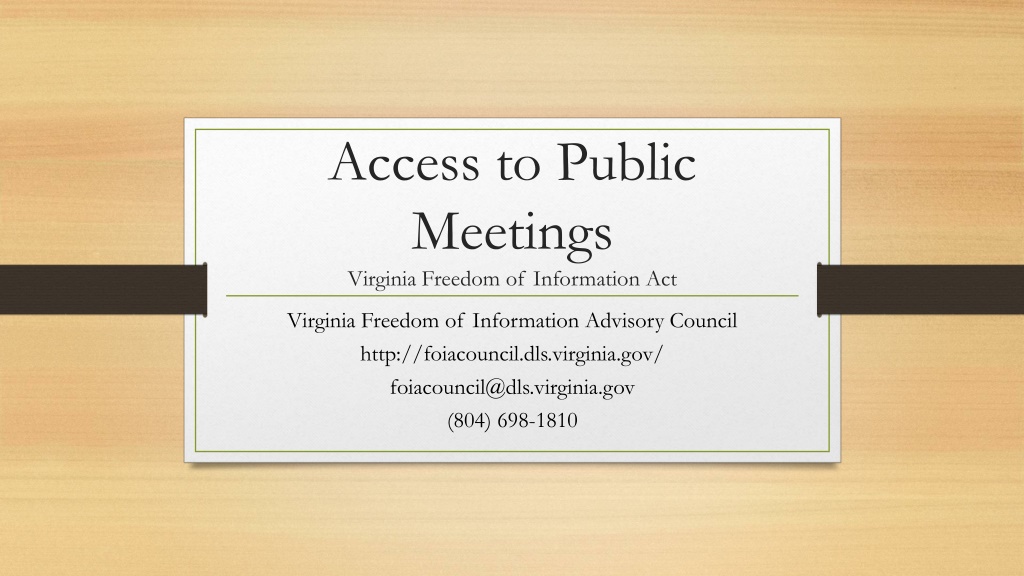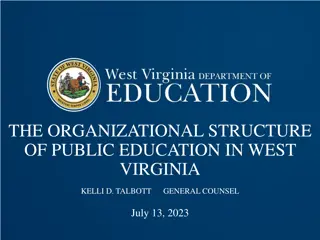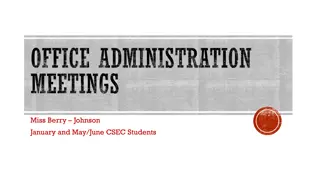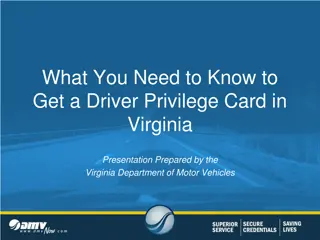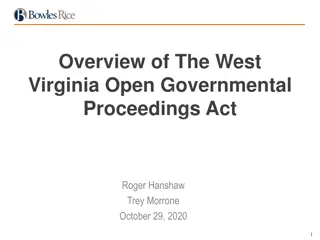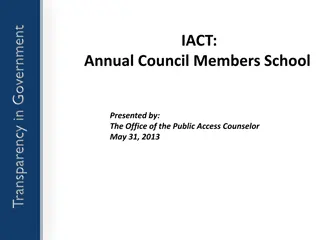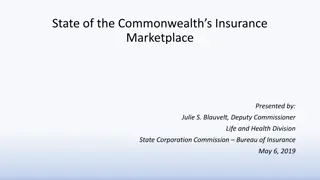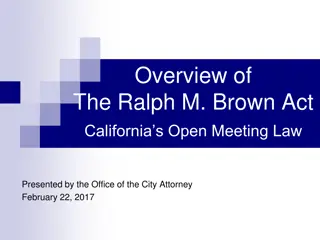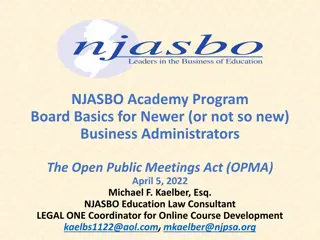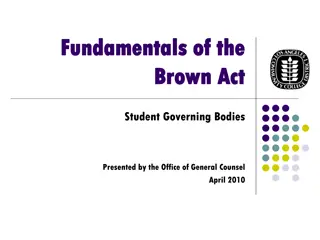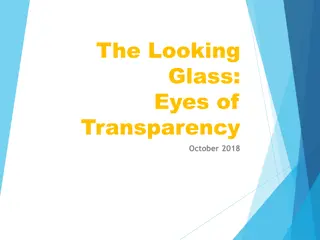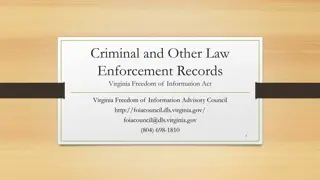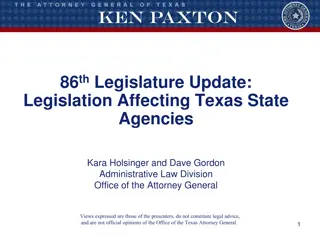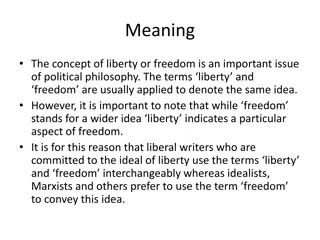Understanding Virginia's Freedom of Information Act and Public Meetings
Explore the Virginia Freedom of Information Act and the regulations surrounding public meetings. Discover the definitions, policy roadmap, and requirements for open and closed meetings under FOIA. Gain insights into the broad scope of public body definitions and exceptions for different types of gatherings. Learn how the act promotes transparency and public engagement in governmental activities.
Download Presentation

Please find below an Image/Link to download the presentation.
The content on the website is provided AS IS for your information and personal use only. It may not be sold, licensed, or shared on other websites without obtaining consent from the author. Download presentation by click this link. If you encounter any issues during the download, it is possible that the publisher has removed the file from their server.
E N D
Presentation Transcript
Access to Public Meetings Virginia Freedom of Information Act Virginia Freedom of Information Advisory Council http://foiacouncil.dls.virginia.gov/ foiacouncil@dls.virginia.gov (804) 698-1810
Roadmap FOIA Policy - 2.2-3700 Definitions - 2.2-3701 Meeting Requirements Open Meetings - 2.2-3707, 2.2-3707.1, 2.2-3707.2, and 2.2-3710 Closed Meetings - 2.2-3711 and 2.2-3712 Electronic Meetings - 2.2-3708.2 and 2.2-3708.3 (effective Sept. 1) 2
FOIA Policy 2.2-3700 All meetings of a public body are presumed open unless a specific exemption applies. Liberal construction to promote an increased awareness by all persons of governmental activities and afford every opportunity to citizens to witness the operations of government Narrow construction of exemptions 3
Definitions 2.2-3701 Public body Traditional public bodies (state boards, local governing bodies, school boards, etc.) [O]ther organizations, corporations or agencies in the Commonwealth supported wholly or principally by public funds. [A]ny committee, subcommittee, or other entity however designated, of the public body created to perform delegated functions of the public body or to advise the public body. 4
Definitions 2.2-3701 Meeting means the meetings including work sessions, when sitting physically, or through electronic communication means pursuant to 2.2-3708.2 or 2.2-3708.3, as a body or entity, or as an informal assemblage of (i) as many as three members or (ii) a quorum, if less than three, of the constituent membership, wherever held, with or without minutes being taken, whether or not votes are cast, of any public body. Exception: gatherings of employees Exception: gatherings where no part of the purpose of such gathering or attendance is the discussion or transaction of any public business, such gathering or attendance was not called or prearranged with any purpose of discussing or transacting any business of the public body, and no discussion or transaction of public business takes place among the members of the public body 5
Definitions 2.2-3701 Exception: public forum, informational gathering, candidate appearance, meeting of another public body, or debate, the purpose of which is to inform the electorate or to gather information from the public and not to transact public business or to hold discussions relating to the transaction of public business, where no discussion or transaction of public business takes place among the members of the public body For purposes of public meetings only, public business means any activity a public body has undertaken or proposes to undertake on behalf of the people it represents. 6
Open Meetings Requirements 2.2-3707, 2.2-3707.1, 2.2-3707.2, and 2.2-3710 Notice to the Public Note that notice to members is not covered by FOIA, but is often stated elsewhere in other laws Open to the Public "Open meeting" or "public meeting" means a meeting at which the public may be present. Minutes 7
Notice Contents 2.2-3707 (D through F) Date Time Location 8
Where should notice be posted? 2.2-3707 (D) FOIA requires all public bodies to post notice in three locations: 1. Official public government website, if any Definition: any Internet site controlled by a public body and used, among any other purposes, to post required notices and other content pursuant to this chapter on behalf of the public body. 2. Prominent public location in which notices are regularly posted; and 3. At the office of the clerk of the public body OR at the office of the chief administrator *State public bodies must also post notice on a central, publicly available electronic calendar maintained by the Commonwealth. 9
When should notice be posted? 2.2-3707 (D) and (E) Regular meetings at least three working days prior to the meeting Do not count the day of the meeting Do not count weekends, holidays, or days when the office is closed Special, emergency, or continued meetings notice that is provided to the members of the public body that are conducting the meeting AND reasonable under the circumstance at the same time as the 10
Are specific people entitled to notice? 2.2-3707 (F) Anyone who annually files a written request for notification with a public body Written request must include: Requester s name Address/Zip Code Daytime telephone number E-mail address, if available Organization, if any 11
Agendas 2.2-3707 (G) At least one copy of the proposed agenda and all agenda packets and, unless exempt, all materials furnished to members of a public body for a meeting shall be made available for public inspection at the same time such documents are furnished to the members of the public body. FOIA does not have requirements regarding specific agenda items, agenda contents or agenda changes FOIA does not address parliamentary procedure 12
What does it mean for a meeting to be open to the public? Definition ( 2.2-3701): "Open meeting" or "public meeting" means a meeting at which the public may be present. Any person may photograph, film, record, or otherwise reproduce any portion of a meeting required to be open. ( 2.2-3707 (H)) No public body shall conduct a meeting required to be open in any building or facility where such recording devices are prohibited. ( 2.2-3707 (H)) 13
Meeting Minutes 2.2-3707 (I) Only required to be taken at open meetings Must include: Date, time, location of the meeting Members of the public body present and absent A summary of matters discussed, deliberated, or decided A record of any votes taken Any motions to enter into a closed meeting and certification after a closed meeting 14
Posting Meeting Minutes 2.2-3707.1 and 2.2-3707.2 State executive branch public bodies ( 2.2-3707.1) Post on official public government website Draft minutes posted no later than 10 working days after the conclusion of the meeting Final minutes posted no later than three working days after final approval Local public bodies ( 2.2-3707.2) Post on official public government website, if any If no such website, make copies available at a prominent public location in which meeting notices are regularly posted or the office of the clerk or chief administrator Post final minutes within seven working days of final approval 15
Votes 2.2-3710 and 2.2-3711(B) All votes taken to authorize the transaction of any public business must be taken and recorded in an open meeting conducted in accordance with FOIA No written or secret ballots May reach consensus or take straw polls in closed meetings However, decisions made in closed meetings are not effective until a vote is taken in an open meeting that reasonably identifies the substance of the vote ( 2.2-3711 (B)) 16
Closed Meeting Procedures 2.2-3711 and 2.2-3712 Motion, Discussion, Certification 17
Motion to Enter into a Closed Meeting 2.2-3712 (A) Public body must take an affirmative recorded vote in an open meeting approving a motion that: 1. Identifies the subject matter for the closed meeting; Must be more than quoting or paraphrasing the exemption 2. States the purpose of the closed meeting; and Quoting or paraphrasing the exemption does state the purpose 3. Makes specific reference to the applicable exemption from the open meeting requirements 18
Closed Meeting Discussions 2.2-3712 (C, F, G, and I) Restricted to those matters specifically exempted from the provisions of FOIA and identified in the motion (do not stray off topic) Who may attend? Nonmembers if they are necessary or will aid consideration of the topic Other members of public bodies may attend, but not participate in, closed meetings of committees, subcommittees, and other sub-entities of the parent body Minutes are not required, and if taken, are exempt from FOIA 19
Certification of a Closed Meeting 2.2-3712 (D) and 2.2-3714 (C) At the conclusion of a closed meeting, public body must certify that the only things heard, discussed, or considered in the closed meeting were: 1. Public business matters lawfully exempted from the open meeting requirements, and 2. Such public business matters as were identified in the motion by which the closed meeting was convened Additional penalty for improper certification Civil penalty of up to $1,000 paid by the public body to the Literary Fund Court may consider mitigating factors 20
Exemptions 2.2-3711 (A) Discussion of personnel - 2.2-3711 (A)(1) Consideration of acquisition or disposition of real property - 2.2-3711 (A)(3) Discussion of prospective business or industry - 2.2-3711 (A)(5) Actual or probable litigation - 2.2-3711 (A)(7) Consultation with legal counsel on specific legal matters - 2.2-3711 (A)(8) Discussion of public safety - 2.2-3711 (A)(19) Discussion of award of public contract - 2.2-3711 (A)(29) 21
Electronic Meetings 2.2-3708.2 and 2.2-3708.3 As of September 1, 2022, there are three general categories: Remote participation: participation by an individual member of a public body by electronic communication means in a public meeting where a quorum of the public body is otherwise physically assembled. All-virtual public meetings: a public meeting (i) conducted by a public body, other than those excepted pursuant to subsection C of 2.2-3708.3, using electronic communication means, (ii) during which all members of the public body who participate do so remotely rather than being assembled in one physical location, and (iii) to which public access is provided through electronic communication means. States of emergency declared by the Governor or the locality 22
Electronic Meetings Remote participation (may be used by any public body) - 2.2-3708.3 Four allowed reasons for remote participation: Personal matter that prevents attendance Medical condition or disability that prevents attendance Medical condition of a family members that prevents attendance Principal residence is 60 miles or more from the main meeting location All of these require a physical quorum and a participation policy Persons with disabilities and their caregivers who participate remotely are counted as if physically present for purposes of determining whether there is a quorum Remote location does not have to be open to the public Personal matters may be used twice per calendar year per member or 25 percent of the meetings of the public body rounded to the next whole number, whichever is greater 23
Electronic Meetings All-virtual public meetings - 2.2-3708.3 May be used by any public body except local governing bodies, local school boards, planning commissions, architectural review boards, zoning appeals boards, and boards with the authority to deny, revoke, or suspend a professional or occupational license Requires a participation policy (but no quorum) Remote locations do not have to be open to the public unless 3 or more members present at that location All-virtual public meetings may be used twice per calendar year per member or 50 percent of the meetings of the public body rounded to the next whole number, whichever is greater Additional procedural requirements 24
Electronic Meetings Policy for remote participation and all-virtual public meetings - 2.2-3708.3 (D) Before using remote participation or all-virtual public meetings, the public body must adopt a policy on participation at least once annually that: Is applied strictly and uniformly, without exception, to the entire membership and without regard to the identity of the member or the matters to be considered or voted upon Describes the circumstances under which an all-virtual public meeting and remote participation will be allowed and the process the public body will use for making requests to use remote participation, approving or denying such requests, and creating a record of such requests Fixes the number of times remote participation for personal matters or all-virtual public meetings can be used per calendar year, not to exceed the limitations set forth in FOIA Does not prohibit or restrict any individual member of a public body who is participating in an all- virtual meeting or who is using remote participation from voting on matters before the public body 25
Electronic Meetings During declared states of emergency ( 2.2-3708.2 and State Budget) During a Governor-declared or local state of emergency: Purpose: to provide for the continuity of operations of the public body or the discharge of its lawful purposes, duties, and responsibilities- 2.2-3708.2 (version in FOIA last amended in 2022) During a Governor-declared state of emergency ONLY Different procedural requirements and limitations State Budget Item 4-0.01 (g) (version in the state budget originally added in 2020) Both may be used by any public body No requirement for a physical quorum or to have a policy in place 26
Electronic Meetings (continued) Members may monitor (listen/watch) even if they cannot participate Public & staff participation is always allowed restrictions only apply to members Please see our Electronic Meetings Guide for a more detailed discussion 27
FOIA & Social Media Because the definition of public records includes all types of records that are in the transaction of public business, various forms of social media may be public records Because any assemblage of three or more members (or a quorum of two) of a public body discussing or transacting public business simultaneously is a meeting subject to FOIA, social media may also be used to conduct meetings Please see our guide on FOIA & Social Media for a more detailed discussion 28
